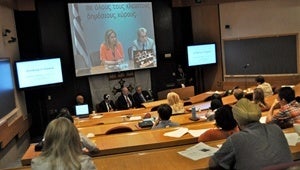September 1, 2010 — Greece, the nation with the world’s highest smoking rate, went smoke-free, with help from research from the Harvard School of Public Health and the Cyprus International Institute for the Environmental and Public Health. At a video press conference held at HSPH on August 30, Mariliza Xenogiannakopoulou, the Greek Minister of Health, thanked the School for its collaboration and help providing scientific evidence to support the nation in its decision. She also thanked HSPH donor George Behrakis, whose donation was the basis for this project.
The new policy bans smoking in all enclosed public spaces, including restaurants, bars and other hospitality venues and workplaces in Greece. It also bans all advertising for tobacco products.
Greece adopted the new policy partly based on the success of the smoking ban in indoor public spaces that took effect January 1, 2010, in Cyprus. At the press conference, researchers from HSPH and the Cyprus University of Technology announced the results of a study that compared air quality before and after the ban on secondhand smoke (SHS) in Cyprus. They found the smoking ban improved air quality by 90% in restaurants, bars and other hospitality venues on the Mediterranean island.
“We’re deeply honored to have the opportunity of accompanying the government and the people of Greece in taking this historic step,” HSPH Dean Julio Frenk said at the press conference. He congratulated the Greek government for its determination to take on the powerful economic forces that promote smoking. The Hellenic Cancer Society also will assist the government in carrying out the smoking ban in Greece. “This is the best of a global health partnership of government, the people and Harvard University,” Frenk said.
The Cyprus and Greece study results were announced simultaneously via a videoconference that included researchers and students at HSPH, the Cyprus International Institute for the Environment and Public Health, and the Greek Health Ministry in Athens.
HSPH has long been active in tobacco control efforts. In 1981, Professor Dimitrios Trichopoulos of the School’s Department of Epidemiology first described the health effects of secondhand smoke, linking it to increased lung cancer risk in people who had never smoked themselves.
In his opening remarks at the press conference, Trichopoulos, the Vincent L Gregory Professor of Cancer Prevention at HSPH, said he was deeply moved by the implementation of the smoking bans to help spare the people from the health hazards of smoking. Greece and Cyprus have the opportunity to become models for reducing smoking in other countries around the globe, he said.
In addition to being a known cancer causing substance, secondhand smoke has been linked to chronic and acute respiratory infections, coronary heart disease, and other diseases.
Cyprus Smoking Ban a Success
Cigarette smoking is the leading cause of preventable death in Cyprus, which, like Greece, has one of the highest smoking rates in the world. “We saw a 90% reduction in secondhand smoke in a country that was said would never adhere to a ban,” said Gregory N. Connolly, professor of the practice of public health and director of the Tobacco Control Research Program at HSPH, who worked on the Cyprus study. “This shows that habits will change if the policy is enforced. We can achieve a smoke-free society and protect the children on the island of Cyprus,” he said.
Connolly and his colleagues, including Costas A. Christophi, adjunct lecturer on environmental and occupational health at HSPH, and Martha Paisi, who participated in the videoconference from Cyprus, measured small respirable particles (RSPs) associated with exposure to secondhand smoke at 21 hospitality sites in Cyprus. In studies conducted before the Cyprus smoking ban, they found dangerous levels of RSPs in the sampled air; after the ban, the levels dropped into a more acceptable range.
Greece Aims to Greatly Lower Smoking Rates
Panagiotis K. Behrakis of the University of Athens and adjunct associate professor of physiology at HSPH, described the Hellenic Air Monitoring Study that measured indoor air pollution attributed to SHS at 150 hospitality venues in five areas of Greece. The researchers found levels reached an extremely high level under certain circumstances, particularly in café/bars and when doors and windows are kept closed during winter months.
Xenogiannakopoulou acknowledged the smoking ban will be a “big challenge” for Greek society. Even though the country is in the midst of an economic crisis, restaurant owners are supportive of the ban, she said. “We have practical and psychological barriers to overcome. This is not a matter of penalizing smokers but has to do with providing social support and information to those people who want to stop smoking,” Xenogiannakopoulou said.
HSPH donor George Behrakis, whose foundation made possible the Greek research, hopes Greece and Cyprus will be models for the rest of the world in how to eradicate smoking. “When in Greece visiting my cousin, who is a great proponent of preventing smoking in that country, I’ve seen people smoking in corridors, hospitals, restaurants, parks and hotels. I have seen the ravages of pulmonary disease and asthma,” he said. “I wanted to do something for the country my parents came from. This is for the children and the future of Greece.”
The researchers and government officials are optimistic that the ban will be successful. Connolly’s objective is to decrease smoking prevalence in Greece by 25% over five years, making Greece a leader in international tobacco control.
“We along with our colleagues in Greece feel confident that we can greatly reduce smoking rates in the country through comprehensive policies based on science,” Connolly said. In Greece there are two million children under age 20; about 35% smoke. “Based on that, we can conservatively project that of all the children alive in Greece today, over 350,000 will be killed prematurely unless urgent action is taken.”
–Marjorie Dwyer
photo: Ned Brown
